Glow Green

 Homepage
Homepage 
Deciding on the right solar panel size, dimensions, and wattage for your home or business can feel a bit daunting, can't it? Residential solar panels in the UK typically range from 250W to 400W, whereas commercial ones might go up to 500W or more. The dimensions, which will impact the panel's efficiency and fit.
In this article, we are offering a rundown of common solar panel sizes, dimensions, and wattages.
See our top picks by our solar experts:
| Panel Make | Model | Wattage(W) | Dimensions |
|---|---|---|---|
| Perlight | Perlight NTA | 415 - 430 | 1686 x 1002 x 35mm |
| Jinko | Tiger Neo | 420 | 1698 x 1002 x 30mm |
| JA Solar | PERC | 555 | 1776 x 1052 x 35mm |
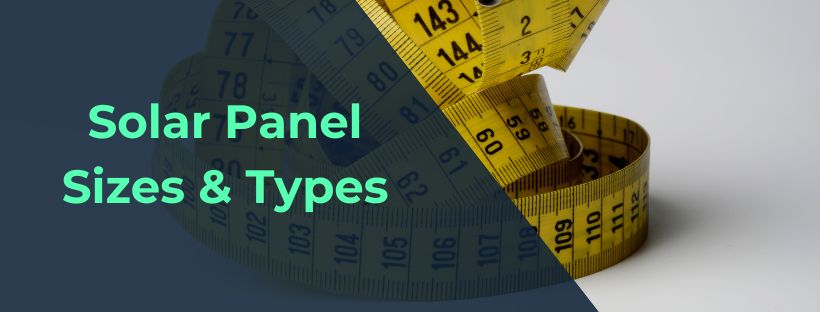
Before we delve into the various sizes and power capacities of solar panels, it's pivotal to understand that these aspects can greatly differ depending on the kind of solar panel in question. The requirements for a comfortable residential use can be quite distinct to those of an extensive commercial undertaking. Indeed, there is much to dissect here.
There's quite a variety in the world of solar panels, isn't there? Typically, when we refer to the 'norm', our minds drift towards panels engineered specifically for domestic use. These are commonly dubbed as 60-cell solar panels and they undoubtedly form the backbone of solar installations in residences. Evidently, larger corporations tend to go for the 72-cell versions, because, let's face it, when it comes to energy provision for an entire office building or warehouse, size genuinely plays a significant part.
Wattage is like the horsepower of solar panels. More watts, more power. It's as simple as that. Residential panels typically have wattages ranging from a modest 250W to a super powered 400W. You'll want to think about how much juice you need for your home.
Remember, the majority of solar panels in circulation today, whether monocrystalline or polycrystalline, are of the crystalline variety. Monocrystalline panels are notably high in efficiency, elegantly designed, and correspondingly priced. Polycrystalline panels, by way of contrast, might be likened to their more economical relative - while they may lack the finesse of their counterparts, they are surely no less capable.
| Panel Type | Avg. Length (mm) | Avg. Width (mm) | Thickness (mm) | Avg. Wattage |
|---|---|---|---|---|
| Residential | ~1650 | ~992 | 35-40 | 250-400W |
| Commercial | ~1968 | ~992 | ~50 | Up to 500W+ |
| Portable/Off-grid | Variable | Variable | Variable | <50-200W |
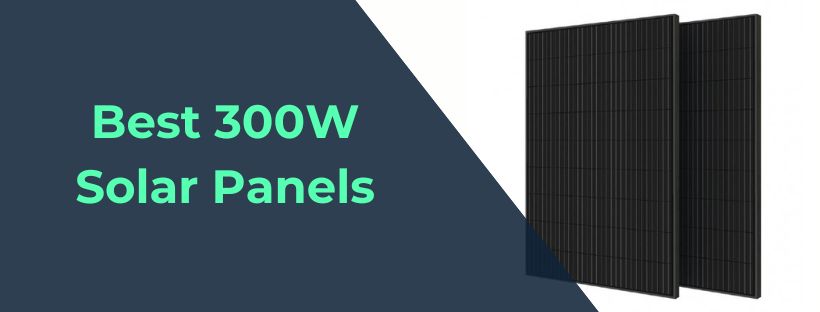
Contemplating a transition to solar energy? It's natural you want to ensure your investment reaps fruitful financial benefits in the long run, right? Let's delve into the finest examples of 300W solar panels you can bank on.
Switch your attention to the Perlight Delta to commence your journey. This formidable solar unit not only furnishes extraordinary power, slightly surpassing 300W, but also commands regard with an impressive efficiency rating of 21.4%. The icing on the cake? A robust 30-year warranty covering both product and performance aspects. Hard to find a flaw, wouldn't you agree?
On the list, LG Neon R Prime could command your interest as well. Commencing at 350W and peaking in the high 300s, this particular model's efficiency and warranty are epitomes of value for money. An efficient performer at 21.5%, supported by an impressive 25-year warranty, this panel can be equated with a reliable ally - consistently dependable.
However, don't rely solely on my analysis. Do explore the SunPower Maxeon 3 for yourself. This small yet powerful model scores high with its efficiency reaching the heights of 22.7%. In premium price territory? Undoubtedly, but factor in the game-changing 40-year warranty and it morphs into a wise long-term investment.
What sets these particular panels apart? It's more than just their wattage. It’s the excellent combination of efficiency, dependability, and comprehensive warranties that endow these models with a standout status. For a clearer picture, why not take a look at this comparison chart I've put together to analyse how they fare when pitted against each other:
| Model | Power Range | Efficiency | Product Warranty | Performance Warranty | Price Bracket |
|---|---|---|---|---|---|
| Perlight Delta | 405W - 425W | 21.4% | 30 years | 30 years | £180 - £200 |
| LG Neon R Prime | 350W - 370W | 21.5% | 25 years | 25 years | £350 - £500 |
| SunPower Maxeon 3 | 415W - 430W | 22.7% | 40 years | 40 years | £350 |
The ball's in your court. Driven by cost? Eager for efficiency? Troubled about warranty? There's the perfect panel out there for you.
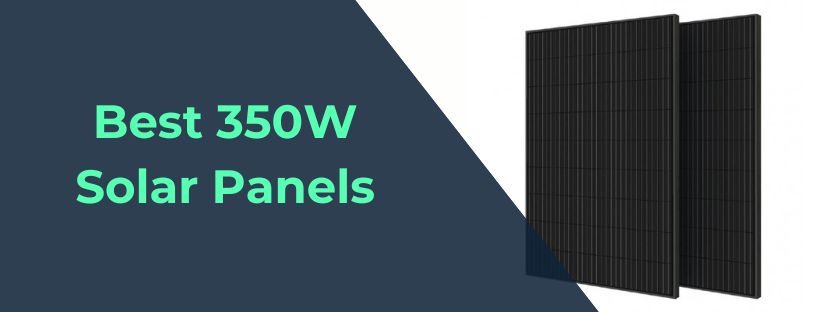
Searching for top-tier solar panels is much like rummaging through a technology enthusiast's treasure trove, wouldn't you agree? You're after the pinnacle of performance, power efficiency, and most importantly, value for money. Keep a keen eye out for those exceptional panels which offer around 350W, these are the ones that afford astounding efficiency paired with robust warranties.
But let's cut to the chase, shall we?
The LG Neon R Prime stands out as a first-rate choice. This hardy panel delivers you around 350W to 370W of power, an admirable contender in terms of efficiency with a considerable 21.5%, and a commendable dual warranty on both the product and performance encompassing 25 long years. While the price tag of £350 to £500 might be a tad steep, many would argue it's worth every penny.
If your pocket is yearning for something more cost-effective, you might fancy the Jinko's Tiger Neo 420W. Yes, it offers slightly higher than your 350W target, but considering the power range of about 400W to 420W and that similar alluring 21.5% efficiency, who's complaining? Toss in a price point of £170 and a 25-year warranty, you'll feel reaping the sunlight has stolen from the stars, and rightly so!
Now, here's the lowdown in one handy table you can reference anytime:
| Model | Power Range (W) | Efficiency | Price Range | Product Warranty | Performance Warranty |
|---|---|---|---|---|---|
| LG Neon R Prime | 350 - 370 | 21.5% | £350 - £500 | 25 years | 25 years |
| Jinko Tiger Neo 420W | 400 - 420 | 21.5% | £170 | 25 years | 30 years |
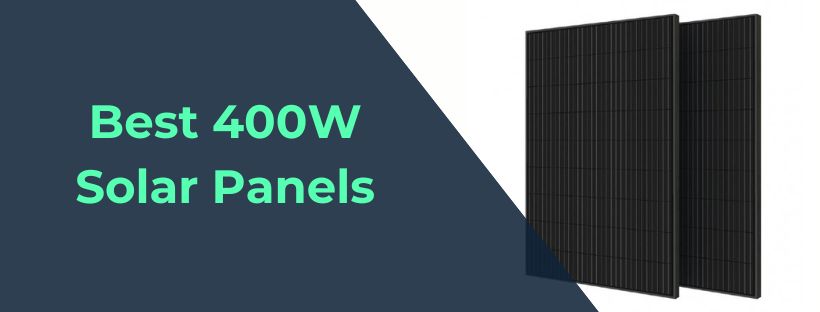
If you're in the market for high-performing 400W solar panels, you're spoilt for choice. These power-packed panels are ideal for those among us who wish to optimise energy yield without demanding an inordinate amount of roof space. Shall we delve into some of the premium choices available?
First up, we have the Perlight NTA. This is a power behemoth, boasting an output peaking at 430W. As for efficiency? An unparalleled 22.28%. Talk about value for money, the Perlight NTA comes with a robust 30-year warranty covering both the product and its performance.
Moving to the Trina Solar Vertex S, it's a crowd favourite with consistently high ratings. It promises a power range stretching up to 435W whilst maintaining an impressive efficiency of 21.8%. Also, its 25-year product warranty is not to be undermined.
How about the SunPower Maxeon 3? It's among the elite, flaunting efficiency ratings reaching up to 22.7%. If durability is your thing, its 40-year warranty breaks all existing records.
Lastly, the Jinko Tiger Neo 420W strikes an excellent balance between cost-effectiveness and premium performance. With an efficiency of 21.5%, it's an economical choice backed by a 30-year performance warranty for peace of mind.
In the realm of solar panels, efficiency reigns supreme. And an extended warranty? That's merely the cherry on top.
With a unique set of advantages for each panel, choosing can be tricky. To help your decision-making process, here's a detailed comparison:
| Model | Power Output | Efficiency | Price Range | Product Warranty | Performance Warranty |
|---|---|---|---|---|---|
| Perlight NTA | 415W - 430W | 22.28% | £175 - £225 | 30 years | 30 years |
| Trina Solar Vertex S | 405W - 435W | 21.8% | £150 - £225 | 25 years | 30 years |
| SunPower Maxeon 3 | 415W - 430W | 22.7% | £350 | 40 years | 40 years |
| Jinko Tiger Neo 420W | 400W - 420W | 21.5% | £170 | 25 years | 30 years |
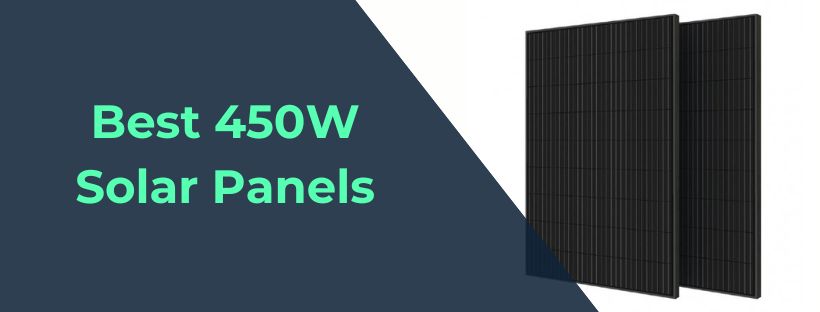
LG NeON H BiFacial: How about more value for your money? These panels offer excellence in design and performance alike. Boasting an output that ranges from 430W to 455W, they sit right in the bullseye of power requirements.
Efficiency? At 19.8%, it's certainly quite commendable, right?
They bring along a generous warranty of 25 years for both product and performance. This quality does come at a slightly higher price, specifically in the £350 to £500 range.
Are you still seeking more? Let's take a look:
JA Solar 555W PERC: This panel is a true powerhouse – 550W! Now, remember, we are specifically seeking a 450W option, correct? However, knowing that a larger capacity is available is potentially a future consideration.
These panels pursue power with gusto, achieving an impressive 21.5% efficiency and a solid 12-year warranty.
The price you can anticipate is around £350.
| Model | Power Output | Efficiency | Product Warranty | Performance Warranty | Price |
|---|---|---|---|---|---|
| LG NeON H BiFacial | 430W - 455W | 19.8% | 25 years | 25 years | £350 - £500 |
| JA Solar 555W PERC | Up to 550W | 21.5% | 12 years | N/A | £350 |
In essence, the wattage of a solar panel provides a glimpse into its capacity to produce power under perfect circumstances.
For residential systems, this wattage tends to float between the range of 250W and 400W. However, in the realm of larger commercial panels, we could potentially see a substantial increase, with wattages potentially exceeding 500W.
The energy output, or as some might call it, the power output of your solar panel is intrinsically linked with the wattage. To put it simply, the higher the wattage, the greater the power output.
Quick fact: The more wattage your solar panel has, the more energy it can produce in a given time.
| Power Output (Wattage) | Residential Solar Panel Sizes | Commercial Solar Panel Sizes |
|---|---|---|
| 250W - 400W | Standard for home systems | 500W+ |
| Often used in larger setups |
When we discuss efficiency in the context of solar energy, we are essentially referring to the aptitude of your photovoltaic cells to transform sunlight into usable electricity. This is a cardinal measure because, truth be told, not all sunlight bestowed upon your panels will ultimately undergo this alchemical process.
However, the development of solar panels has been nothing short of a technical odyssey, with their efficiency witnessing considerable enhancements. Indeed, the figures suggest that the run-of-the-mill cell efficiency oscillates between 15% and 22%.
| Efficiency Range | Meaning |
|---|---|
| 15% - 18% | Standard efficiency for most panels |
| 19% - 22% | High-efficiency solar panels |
When considering a solar panel system for your home, the two key areas to focus on are roof requirements and choosing the right installer. Get these right, and you're halfway to a greener home.
| Attribute | Consideration | Impact on Installation |
|---|---|---|
| Roof Size | Larger roofs accommodate more panels | Increases potential energy output |
| Strength | Structural assessment required | May necessitate additional supports |
| Orientation | South-facing preferred | Maximises solar energy collection |
| Tilt Angle | Usually between 10° and 60° | Influences efficiency |
| Shading | Presence of obstructions | Decreases solar panel efficiency |
Finding a trustworthy solar panel installer is like finding a good mechanic – absolutely vital! Consider this:
| Factor | Detail | Significance |
|---|---|---|
| Accreditation | MCS Certificate | Ensures quality and adherence to regulations |
| Portfolio | Evidence of past installations | Demonstrates experience and skill |
| Reviews | Customer feedback | Offers insight into reliability and service quality |
| Aftercare | Warranty and maintenance terms | Provides peace of mind post-installation |
Remember, getting these steps right could save you a headache and some quid later down the road. So, have a chat with a few installers before putting down any cash.
| Factor | Detail | Importance |
|---|---|---|
| Average Monthly Energy Consumption (kWh) | Check past electricity bills to calculate. | Determines the baseline for your needs. |
| Electricity Usage Pattern | Day vs. night usage, high-consumption appliances. | Influences the timing of energy use. |
| Solar System Size (kW) | The total output needed to match your usage, taking into account UK sunlight availability. | Dictates capacity of the setup. |
| Home Solar Panel Count & Wattage | ||
| Determined by system size and panel specifications. | Determines the number and type of panels required. |
| Factor | Detail | Importance |
|---|---|---|
| Average Monthly Energy Consumption | Calculate based on past electricity bills. | Establishes your energy needs. |
| Electricity Usage Pattern | Consider when you use the most electricity, such as during the day or at night. | Influences energy production and usage timing. |
| Solar System Size (kW) | Total output needed to meet your energy consumption, considering sunlight availability. | Determines system capacity. |
| Home Solar Panel Count & Wattage | Number and wattage of panels required to meet energy needs within available space. | Limited by available roof or install area. |
| Energy Production vs. Consumption | Aim for solar output to exceed or match energy consumption for efficiency and savings. | Directly impacts system effectiveness. |
| Available Space for Panels | The physical area available for panel installation, often constrained by roof dimensions. | Determines the maximum system size. |
FAQs
Residential solar panels in the UK typically measure around 190cm x 100cm x 4cm.
A single solar panel producing around 1 kW may not be sufficient. You would likely need multiple panels totaling up to 1 kW.
For solar panels generating 450 watts, you'll need a substantial amount of space on your roof. However, remember that efficiency also plays a significant role, not just wattage.
Domestic solar setups in the UK typically use panels within the range of 250W to 400W.
A hefty 400W solar panel will occupy a significant portion of roof space. Remember, while size matters, it's not the only factor to consider.
For a typical UK home, balance panel size with energy needs. Whether it's a 3kW or 4kW system, avoid going overboard if it's unnecessary.